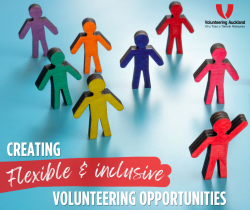Creating Flexible and Inclusive Volunteer Roles for All

Volunteering is a cornerstone of thriving communities, offering individuals the opportunity to contribute their skills and time toward meaningful causes. However, not everyone has equal access to volunteer opportunities. Barriers related to age, physical ability, or economic circumstances can hinder participation. By designing flexible and inclusive roles, community organisations can ensure that volunteering is accessible to everyone, fostering diversity and broadening their impact.
Why Flexibility and Inclusivity Matter
1. Broadening Participation
Flexible and inclusive roles attract a wider range of volunteers, bringing diverse perspectives and skills to the organisation.
2. Building Community Resilience
Inclusive volunteering strengthens social bonds and empowers marginalised groups, making communities more resilient.
3. Enhancing Organisational Impact
A diverse volunteer base enriches the organisation’s ability to address complex challenges effectively.
Strategies for Developing Flexible Volunteer Roles
1. Offer a Range of Commitment Levels
Create opportunities that accommodate different time constraints. For instance:
- Micro-volunteering: Short, task-based roles such as proofreading documents or running errands.
- Project-Based Volunteering: Roles with a clear beginning and end, such as organising a single event.
- Ongoing Roles: Flexible schedules for regular volunteers who can contribute as their availability allows.
2. Leverage Technology
Technology can enable remote volunteering, making it accessible to individuals who face transportation or mobility challenges. Examples include:
- Virtual tutoring programmes.
- Online advocacy campaigns.
- Digital content creation, such as managing social media or designing promotional materials.
3. Adapt Roles to Physical Abilities
Design roles that accommodate varying levels of physical ability. Examples include:
- Administrative tasks such as data entry or phone calls.
- Virtual volunteering opportunities for people with limited mobility.
- Partnering able-bodied volunteers with those who need physical assistance to ensure everyone can participate.
4. Provide Training and Support
Equip volunteers with the skills they need to succeed, regardless of their starting point. Consider:
- Offering training sessions that accommodate different learning styles.
- Assigning mentors or buddy systems to provide ongoing support.
Ensuring Economic Inclusivity
1. Eliminate Financial Barriers
Volunteering should not impose a financial burden. Organisations can:
- Reimburse transportation costs or provide travel vouchers.
- Supply necessary materials, such as uniforms or equipment, free of charge.
2. Flexible Scheduling for Working Volunteers
Design roles that accommodate people with full-time jobs or irregular schedules. For example:
- Evening or weekend shifts.
- Roles that can be completed at the volunteer’s convenience, such as writing or research tasks.
3. Promote Skill Development
Emphasise roles that help volunteers develop marketable skills, increasing their employability. Examples include:
- Leadership roles within projects.
- Opportunities to learn technical skills, such as website management or fundraising strategies.
Addressing Age Related Barriers
1. Engage Youth Volunteers
Young people bring energy and fresh ideas to volunteer work. Create roles tailored to their strengths and schedules, such as:
- Social media management or tech support.
- Event promotion in schools or colleges.
- Participation in environmental clean-ups or creative projects.
2. Include Older Adults
Older volunteers often have valuable experience and time to contribute. Roles suited for them include:
- Mentorship programmes.
- Storytelling or historical archiving projects.
- Flexible roles that allow for breaks or less physically demanding tasks.
Examples of Flexible and Inclusive Volunteer Roles
1. Flexible Food Distribution
A food bank in an urban area could offer roles ranging from packing food parcels to delivering them. Volunteers can choose to work a single shift or sign up for regular weekly slots.
2. Virtual Crisis Support
A mental health organisation could train volunteers to provide crisis counselling via text or online chat, allowing people to help others from the comfort of their homes.
3. Intergenerational Gardening Projects
A community garden could bring together volunteers of all ages and abilities. Tasks can be tailored to individual preferences, such as planting, weeding, or sharing gardening tips.
4. Skill-Sharing Workshops
An arts organisation could invite volunteers to host virtual or in-person workshops, sharing skills like knitting, painting, or coding. These workshops can be accessible to participants with diverse schedules and abilities.
How Leaders Can Foster Inclusivity
1. Conduct Needs Assessments
Understand the barriers potential volunteers face by engaging with community members and gathering feedback.
2. Promote Opportunities Broadly
Use multiple platforms—social media, community boards, schools, and local businesses—to reach diverse audiences.
3. Celebrate Contributions
Recognise the efforts of all volunteers, regardless of the size of their contribution. Celebrations and thank-you events can reinforce the value of their involvement.
4. Monitor and Improve
Regularly review volunteer programmes to ensure they remain inclusive and responsive to community needs.
The Ripple Effect of Flexibility and Inclusion
By creating volunteer roles that are accessible to everyone, community organisations not only increase participation but also strengthen the social fabric. Inclusive programmes:
-
Empower Individuals: Volunteers gain confidence and a sense of purpose.
-
Enhance Diversity: Broader participation brings new ideas and perspectives.
-
Deepen Impact: A more diverse and engaged volunteer base amplifies the organisation’s reach and effectiveness.
Conclusion
Developing flexible and inclusive volunteer roles is essential for community organisations to thrive in today’s diverse world. By addressing barriers related to age, physical ability, and economic circumstances, leaders can ensure that everyone has the opportunity to contribute. In doing so, they not only enhance their impact but also create a culture of inclusivity and shared purpose that benefits the entire community.

